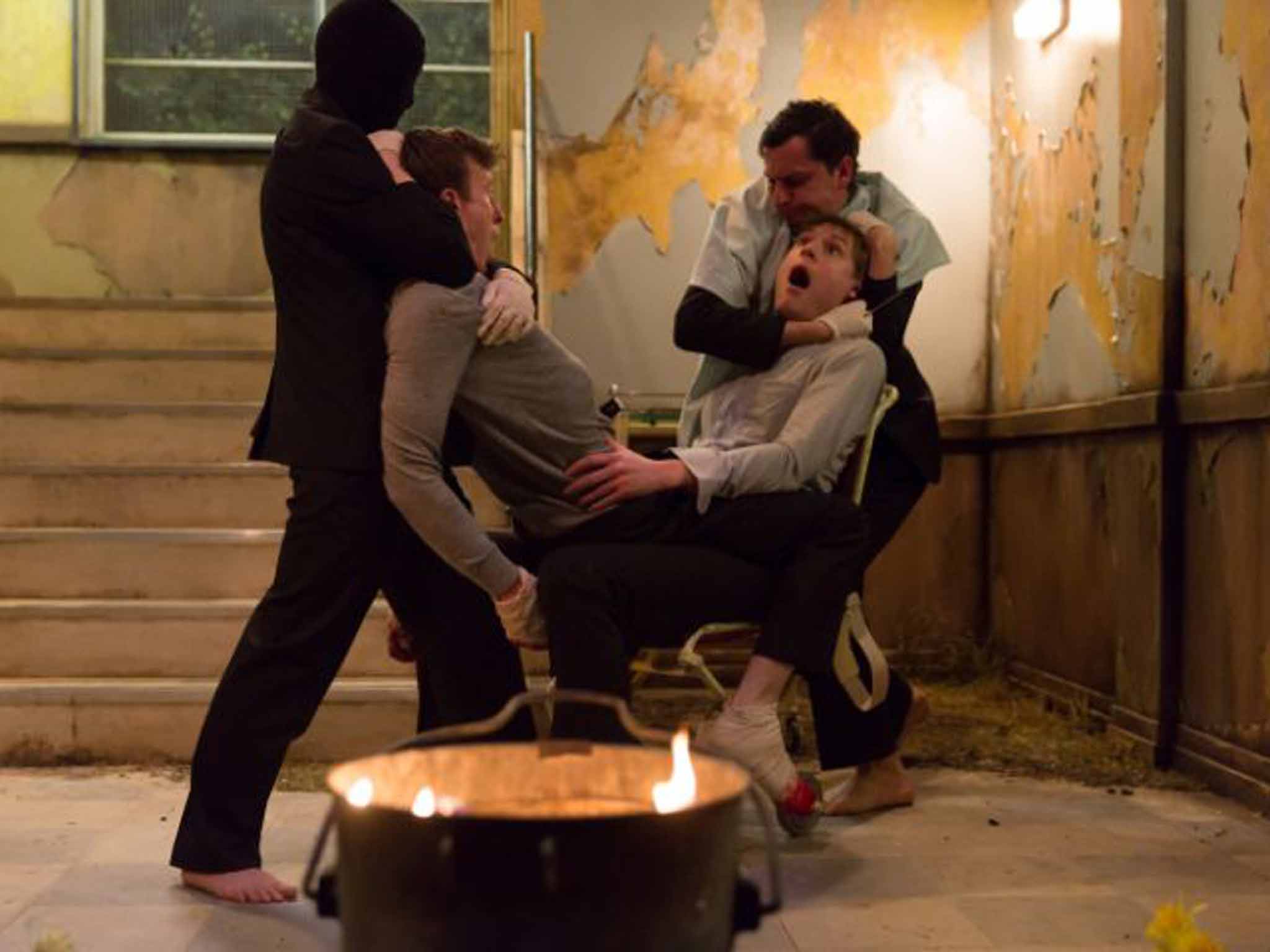Fainting is not funny: The trials of a theatre critic, from 'Cleansed' to 'Titus Andronicus'
As a regular fainter, theatre critic Holly Williams was worried the notoriously gory play 'Cleansed' would have her keeling over on press night. She stayed upright...this time

It begins with feeling sick, then spreads. A rapid prickle of cold sweat, a swimmy light-headedness, a ringing in the ears. Stars twinkle before my eyes, and if I don't get my head between my knees fast, darkness descends.
I am a fainter. I'll do it for prosaic reasons – standing up too long at festivals, getting out of the bath – but also squeamish things such as needles and blood: my own, other's people's, even the fake stuff.
And I'm not alone in this last one: swooning at stage violence has been in the news after Sarah Kane's play Cleansed opened at the National Theatre to breathless reports of people passing out. I went to review it last week, with some trepidation, knowing it featured mutilated limbs and tongue-slicing. I confess: I nearly keeled over in the very first scene, when a man has heroin injected into his eye. I sat sweating lightly in the stalls, telling myself sternly to breathe. Not only would fainting in the first five minutes fatally undermine my ability to write about it, but it would also be extremely embarrassing.
I have form here; in 2014, the press went bonkers reporting on the hundreds of “droppers” at a blood-soaked production of Titus Andronicus at the Globe. I went to review it blithely – I'd never blacked out at fictional violence. Yet the sight of a woman who'd been raped and had her tongue cut out spewing seemingly gallons of blood over the stage… well, the next thing I remember is waking up in a stranger's lap, having toppled backwards off the bench seating. Good sir, if you're reading, I apologise for head-butting you in the balls. Blame Shakespeare.
I managed to keep it together for Cleansed – and didn't see any fainters at press night. Yet the enthusiastic reporting of the phenomenon points to our rather lurid fascination with the reaction. It is also not usually a kind response. I can appreciate that if you don't have the tendency, such an extreme physiological reaction to simulated violence is bemusing. But it's unfair that it's also considered amusing. No-one would laugh at an epileptic fit or extreme allergic reaction – so why should I be so red-faced and sheepish about fainting?
Yet people seem to feel perfectly justified in expressing their incredulity at, or just flat-out mocking of, fainters. Consider also the media reaction to a man passing out at a play in New York recently – it was gleefully reported that he was overcome by the sight of Russell Tovey taking his top off. The fainter tweeted afterwards that he was “mortified”, adding that it would provide people with “plenty of ammo to poke fun at me”.
And there is certainly a gendered reaction here – if it's irritating for me, as a young woman, to be placed in the delicate-little-flower category because of my tendency to topple, then it must be even harder for the opposite sex, still expected by society to “man up” in the face of violence and horror (real or fictional).
It's also hard to shift the historical cliché of the swooning woman, overcome by romance or grief. Such light-headedness used to be blamed on our wombs – although tightly laced corsets that made breathing difficult were really to blame – but in the 18th century it was also considered a desirable trait, evidence of a refined sensibility. Sadly, the hangover from this means a medical condition is tainted with period-drama girlishness.
Fainting is an involuntary, physical reaction – syncope, to give it it's scientific name. A neurally mediated syncope is caused by a temporary malfunction in the autonomic nervous system (the brain, nerves and spinal cord). Blood pressure plummets – and so do you. Another common one is a vasovagal syncope: your heartbeat slows down or even pauses for a few seconds, disrupting the brain's blood supply. Sudden or extreme pain, the sight of blood and overheating are the most common culprits for both these responses.
As someone with low blood pressure anyway, it's no wonder I'm prone. But fainting may also be genetic. Research led by Samuel Berkovic, a neurologist at the University of Melbourne, found in 2013 that “fainting can have a genetic origin… if you have the trait, then 50 per cent of your offspring have it, going through a family like a golden thread”. Makes sense: the only person I know who faints more regularly than me is my mum. Don't mock me, then, if I pass out in the aisle: it's my genes that are to blame.
Subscribe to Independent Premium to bookmark this article
Want to bookmark your favourite articles and stories to read or reference later? Start your Independent Premium subscription today.

Join our commenting forum
Join thought-provoking conversations, follow other Independent readers and see their replies